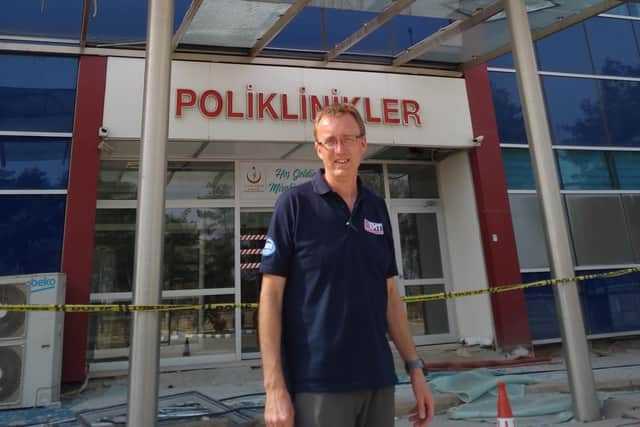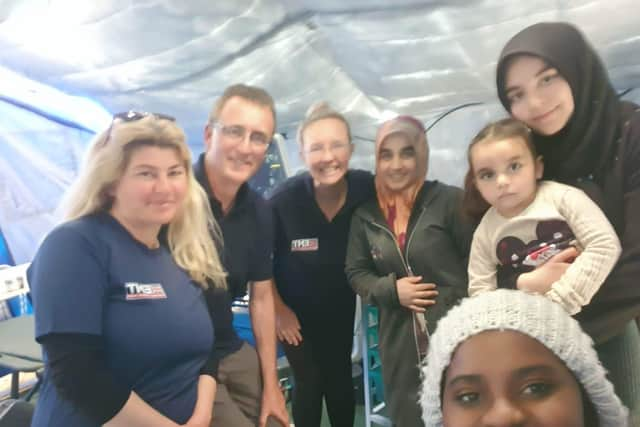Forth Valley Royal baby doctor helped mums-to-be pulled from Turkey earthquake rubble
Obstetrician Paul Holmes is part of the UK-Emergency Medical Team deployed to Turkey through the Foreign, Commonwealth & Development Office (FCDO).
Normally based at FVRH in Larbert, Paul arrived in Turkey on February 11 and worked alongside Turkish medics at a joint MoD-FCDO field hospital in Türkoğlu, southern Turkey. Paul – who returned from his three-week deployment last Saturday, March 4 – said: “I’ve come across mums who have literally been pulled out of the rubble. They had not been dramatically badly injured thankfully. There’s been a few follow-up appointments with those with earthquake injuries like taking stitches out.
Advertisement
Hide AdAdvertisement
Hide Ad“Carrying a baby is obviously worrying for any mother at the best of times, let alone when you have survived an earthquake on this scale and in many cases have been left totally homeless and sleeping in a tent. I think when you are in a stressful situation and pregnant you probably transfer lots of that anxiety towards the baby, so it’s been really nice to be able to reassure these women.


“We were based in the grounds of a hospital that is no longer usable because of the earthquake, so we are able to offer ultrasound scans and help them hear the baby and let them know the pregnancy is still going nicely despite the trauma they’ve gone through.”
More than 50,000 people have been killed in southern Turkey and northern Syria and thousands more remain missing.
Big-hearted Brits have pledged staggering £100 million to the Disasters Emergency Committee (DEC) Turkey-Syria earthquake appeal, with the UK Government match-funding the first £5 million of public donations through its UK Aid Match scheme.
The UK Government responded immediately to the disaster by deploying a team of 77 search and rescue experts with specialist equipment, including four firefighters from the Scottish Fire & Rescue Service. It then announced a further £25 million major UK package of support on February 15, with the UK responding to needs on the ground in Turkey and in Syria in line with requests from the Turkish authorities, the UN and aid agencies.


Paul volunteered through frontline medical aid charity UK-Med to work at the joint field hospital, which has treated over 6000 patients.
Born in Ballynahinch, County Down, near Belfast, the 56-year-old left Northern Ireland aged 18 to study medicine at University of Edinburgh and has settled in Scotland, living in Dunblane and working at FVRH.
The brave medic continued to treat patients despite the area being rocked by series of smaller magnitude earthquakes and aftershocks. Speaking before he returned home, dad-of-four Paul said: “Whilst we’ve been here there’s been very noticeable aftershocks. When I was in Nepal in 2015, there were one or two little aftershocks where you thought ‘Is that an aftershock or not?’. This time you are left in absolutely no doubt.
Advertisement
Hide AdAdvertisement
Hide Ad“There’s been two fairly major ones since we got here. The first one briefly set the hospital building on fire, which was slightly nerve-wracking. I saw smoke after it triggered an electrical fire but thankfully it was brought under control very quickly and there wasn’t huge damage.


"We had to move our overnight camping tents because they were deemed a bit close to the hospital.
“The other big aftershock happened in the evening time when we were standing around chatting. It’s not enough to knock you off your feet but the closest thing I can compare it to is when you are on a boat in choppy seas. You are not being thrown from side to side, but if you were trying to walk, you’d be unstable.
“Personally, that is obviously worrying. Fortunately, advances in technology mean I’ve been able to phone my wife each day via WhatsApp so they know I am okay. My children are not teeny-tiny kids so I think it’s been easier for them to get their heads round than when I was sent to Nepal.”
UK aid pays for EMT staffs’ regular roles to be backfilled to ensure the NHS is not impacted.
Paul said: “It is a privilege to be part of the UK Government’s humanitarian response because the Turkish people are so grateful and thankful for us for supporting them in their hour of need. The Turkish medics I’m working with are wonderful people. I’ve also got very good colleagues at home who have arranged for some knitted woollen baby hats to be sent out from Larbert and helping fill in for me.
“Kids are coming in with lots of respiratory infections and illnesses, partly from living in tents in temperatures of minus seven or eight at night. I know the tents we are camping in have had ice on the inside some mornings never mind on the outside.
“Some of the patients have psychological problems and we are trying to help them. If you are cold and hungry and living in a tent with another ten people that can only add to a mum-to-be’s natural worry about the pregnancy so we are supporting the community by replacing services that were unavailable.”
Advertisement
Hide AdAdvertisement
Hide AdUK Minister for Development Andrew Mitchell said: “The UK Government is proud that brave Scottish firefighters and medics have been at the very heart of our efforts to help the Turkish people in their hour of need.
“Both the UK-ISAR and UK-EMT pool world-leading expertise from across Britain to make a real difference in reacting to humanitarian disasters around the globe.
“The UK Government’s priority now is to ensure that humanitarian assistance reaches the thousands of families left homeless by the earthquake. It will be so vital in ensuring those affected can begin to rebuild their lives.”